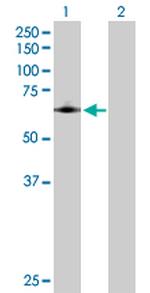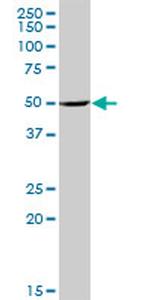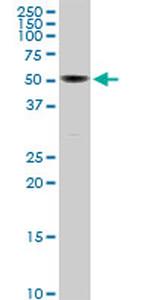Search Thermo Fisher Scientific
FIGURE: 1 / 3
PTGS1 Antibody (H00005742-D01P) in WB
Lane 1: PTGS1 transfected lysate(68.70 KDa).
Lane 2: Non-transfected lysate.



Product Details
H00005742-D01P
Species Reactivity
Host/Isotype
Class
Type
Immunogen
Conjugate
Form
Concentration
Purification
Storage buffer
Contains
Storage conditions
Shipping conditions
Product Specific Information
Sequence of this protein is as follows: MSRSLLLRFL LFLLLLPPLP VLLADPGAPT PVNPCCYYPC QHQGICVRFG LDRYQCDCTR TGYSGPNCTI PGLWTWLRNS LRPSPSFTHF LLTHGRWFWE FVNATFIREM LMRLVLTVRS NLIPSPPTYN SAHDYISWES FSNVSYYTRI LPSVPKDCPT PMGTKGKKQL PDAQLLARRF LLRRKFIPDP QGTNLMFAFF AQHFTHQFFK TSGKMGPGFT KALGHGVDLG HIYGDNLERQ YQLRLFKDGK LKYQVLDGEM YPPSVEEAPV LMHYPRGIPP QSQMAVGQEV FGLLPGLMLY ATLWLREHNR VCDLLKAEHP TWGDEQLFQT TRLILIGETI KIVIEEYVQQ LSGYFLQLKF DPELLFGVQF QYRNRIAMEF NHLYHWHPLM PDSFKVGSQE YSYEQFLFNT SMLVDYGVEA LVDAFSRQIA GRIGGGRNMD HHILHVAVDV IRESREMRLQ PFNEYRKRFG MKPYTSFQEL VGEKEMAAEL EELYGDIDAL EFYPGLLLEK CHPNSIFGES MIEIGAPFSL KGLLGNPICS PEYWKPSTFG GEVGFNIVKT ATLKKLVCLN TKTCPYVSFR VPDASQDDGP AVERPSTEL
Target Information
PTGS1 (COX1, Cyclooxygenase 1) is the key enzyme in prostaglandin biosynthesis, and acts both as a dioxygenase and as a peroxidase. There are two isozymes of PTGS: a constitutive PTGS1 and an inducible PTGS2, which differ in their regulation of expression and tissue distribution. This gene encodes PTGS1, which regulates angiogenesis in endothelial cells, and is inhibited by nonsteroidal anti-inflammatory drugs such as aspirin. PTGS1 is thought to be involved in cell-cell signaling and maintaining tissue homeostasis. Alternative splicing of this gene generates two transcript variants. The expression of these two transcripts is differentially regulated by relevant cytokines and growth factors.
For Research Use Only. Not for use in diagnostic procedures. Not for resale without express authorization.
References (0)
Bioinformatics
Protein Aliases: COX-1; Cyclooxygenase-1; Cytochrome c oxidase polypeptide I; Cytochrome c oxidase subunit 1; P PGG/HS; PGH synthase 1; Prostaglandin G/H synthase 1; Prostaglandin H2 synthase 1; Prostaglandin-endoperoxide synthase 1; prostaglandin-endoperoxide synthase 1 (prostaglandin G/H synthase and cyclooxygenase)
Gene Aliases: COI; Cox-1; Cox-3; COX1; COX3; COXI; MT-CO1; MTCO1; PCOX1; PES-1; PGG/HS; PGHS-1; PGHS1; PHS 1; PHS1; PTGHS; PTGS1
UniProt ID: (Human) P23219, (Mouse) P22437
Entrez Gene ID: (Human) 5742, (Mouse) 19224

Performance Guarantee
If an Invitrogen™ antibody doesn't perform as described on our website or datasheet,we'll replace the product at no cost to you, or provide you with a credit for a future purchase.*
Learn more
We're here to help
Get expert recommendations for common problems or connect directly with an on staff expert for technical assistance related to applications, equipment and general product use.
Contact tech support
